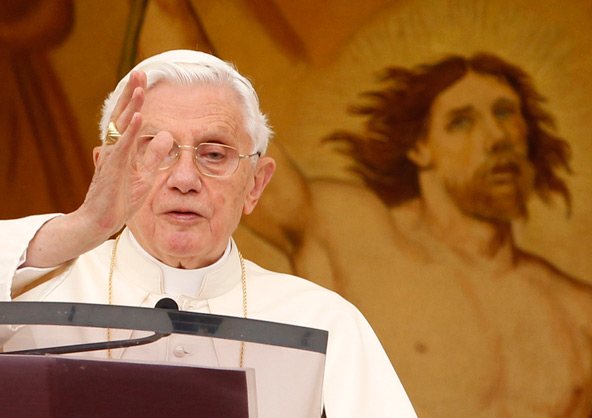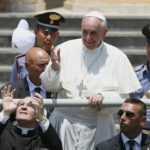
VATICAN CITY (CNS) — Everything that happens in life, whether it first appears good or bad, is a reminder that human beings do not have absolute control over their own destinies but were made to be in a relationship with God, Pope Benedict XVI wrote.
“Each thing, each relationship, each joy, like each difficulty, finds its ultimate meaning in being an occasion for a relationship with the Infinite, the voice of God who continually calls us and invites us to raise our sights and to discover in him the fullness of our humanity,” the pope said in a message to participants in an annual meeting of the Communion and Liberation movement.
The Aug. 19-25 meeting in Rimini, Italy, was to focus on people's relationship with the infinite.
In his message, released at the Vatican on the meeting's opening day, Pope Benedict said the natural human yearning for infinity or eternity is, at its foundation, recognition that human beings are creatures.
“This word — creature — seems to be old-fashioned. People prefer to think of themselves as self-made and artisans of their own destiny. Considering the person a creature can be uncomfortable because it implies an essential reference to something other or better,” he said.
In fact, however, whether they believe in God or not, human beings have that inkling that they are not in complete control and that they were made for eternity, he wrote.
Recognizing God as creator and entering into a relationship with him “does not hide or diminish, but brilliantly reveals, the greatest and supreme dignity of man, who is called to life in order to have a relationship with life itself, with God,” the pope wrote.
Some people ask how it is possible for a finite creature like a human being to have a real relationship with the infinite God, he said. For Christians, the answer is that God assumed a finite form in Jesus Christ.
“From the Incarnation, the moment in which the Word was made flesh, the unbridgeable distance between the finite and infinite was erased,” Pope Benedict wrote.
Also Aug. 19, the pope recited the Angelus with visitors in the courtyard of the papal summer villa at Castel Gandolfo. Commenting on the day's Gospel reading, the pope said that by taking on human form, Jesus was able to suffer and die for the redemption of all humanity.
“We need to accept him with faith, not be scandalized by his humanity,” the pope said.
Jesus continues giving himself to his followers in the Eucharist, his body and blood, he said.
“Let us rediscover the beauty of the sacrament of the Eucharist, which expresses all the humility and holiness of God: his making himself small, a fragment of the universe to reconcile it completely in his love,” the pope said.
— Cindy Wooden, Catholic News Service






